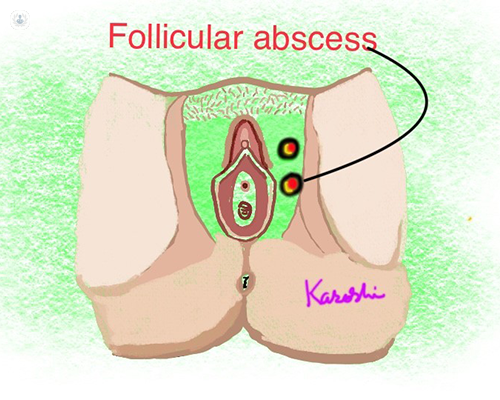Recurrent vaginal skin infections: Could diabetes be the cause?
Written in association with:In this informative article, highly respected consultant gynaecologist and women’s health expert Mr Mahantesh Karoshi shares his expert insight on the causes of recurrent vaginal skin infections and details how they can lead to the development of a vulvar abscess. The revered specialist also sheds light on how recurrent vaginal skin infections may be linked to undiagnosed diabetes or pre-diabetes and the importance of testing for the condition in women experiencing chronic infections of this type.

Vulvar abscess, folliculitis or follicular abscess
Vulvar abscess (vulva = outer part of the female genitalia) is a common gynaecological problem that has the potential to result in severe illness. These abscesses typically originate as simple infections that develop in the vulval skin and can spread to deeper layers. The spread of infection and abscess formation in the vulval area is facilitated by the loose areolar tissue in the deeper layers of the skin.
The contiguity of vulval fascial spaces with other anatomic compartments permits the spread of infection from the vulva to the inner thigh and abdominal wall. The causative bacteria of vulvar abscesses are often mixed bacterial infections, consisting primarily of MRSA and bacteria which do not need oxygen for their multiplication (anaerobes).

How are vulvar abscesses diagnosed and treated?
The diagnosis is mainly made by inspecting the swelling and feeling the size of the lesion. The treatment of a vulvar abscess depends upon the lesion size and the patient's risk factors for failure of therapy.
Small lesions (<2cms) often resolve with conservative therapy, such as warm compresses and antibiotic therapy. However, incision and drainage is the mainstay of treatment of vulvar abscess if it is larger than 2 centimetres in size.
How do recurrent vaginal skin infections relate to diabetes?
For women with undiagnosed diabetes or pre-diabetes, vaginal infections may often occur because these organisms multiply unchecked in the high sugar environment. Skin health is often a reflection of general health and could be a pointer to issues like diabetes if infections of the skin, wounds or sores refuse to heal.
With hidden diabetes, such recurrent infections are more frequent and also appear to have a poorer response to therapy such as antibiotics and sometimes can progress to a severe form of infection like blood poisoning (sepsis). This means women affected by this problem need tests to rule out diabetes. There is good evidence that sound control of blood sugar can improve outcomes so intervention is very beneficial for recurrent vaginal skin infections.
If you are concerned about vaginal skin infections or a vulvar abscess and wish to schedule a consultation with Mr Karoshi, you can do so by visiting his Top Doctors profile.


